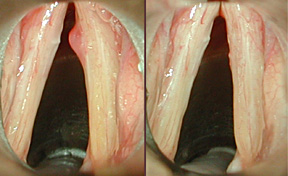Today we will bring POLYPS on the vocal chord to your attention.
We all dread that something would happen to our instrument. So how can you know that something might be wrong with the two small muscles down your throat? Please read on, because having an awareness on how YOUR instrument works and feels, is very important for a healthy long lived voice. And to know what to do, and what to look/feel for.
What is a polyp?
“A polyp is a specific and clearly demarcated mass (“mass” simply means “lump,” and does not imply cancer or precancerous lesion) us
ually found at the midpoint the vocal cord. This typical location suggests that polyps are the result of phonotrauma, the physical stresses on the vocal fold which occur with heavy voice use or voice use under adverse circumstances. Some believe that polyps are formed by localized bleeding of the small blood vessels of the vocal folds when they are ruptured by shear forces.”
——————————————————–
What could be signs and symptoms of vocal chord polyps?
Nodules and polyps cause similar symptoms:
- hoarseness
- breathiness
- a “rough” voice
- a “scratchy” voice
- harshness
- shooting pain from ear to ear
- a “lump in the throat” sensation
- neck pain
- decreased pitch range
- voice and body fatigue
http://www.asha.org/
Other symptoms and advice (from a singers point of view)
- Voice feels “grey”/lacks spark/shine
- Voice isn’t as flexible and you can’t do the things you normally can
- Singing feel like a battle, even “easy” things. Especially in the middle of the register (or high, this depends)
- You can’t trust the voice, sometimes it works, other times not at all, and you balance between disaster and an “ok” performance
- You start to feel bad about singing/loosing confidence and joy in what you do
- You have to warm up a lot to make the instrument work
- Not finding the “focus” in the voice, feels woolen (too “broad” sound) and it doesn’t carry
- Other people might say they”can’t hear it” or “I think it sound good”, but if you feel it isn’t: SEE your Doctor!
- If you feel that something is wrong (especially after heavy singing on a bad voice, perhaps even when you had a cold) SEEK advice from a doctor as soon as possible. No! you are not being a diva. It’s about voice-health!
- DON’T sing on it (if you know you have one) It can lead to another polyp (friction), get bigger or develop into a nodule, which is worse!
- Go to the doctor, go, go, GO! Don’t wait. It will get worse if you sing on it. (And you will have to take some time off to recover, whatever treatment is necessary in your case).
How is a polyp treated?
“Voice rest, often prescribed in cases of hoarseness, may improve the voice somewhat, but is not likely to make a polyp go away. Voice rest serves soften and dissolve associated swelling, but the polyp itself is generally too firm and bulky to shrink significantly.
Nodules and polyps may be treated medically, surgically, and/or behaviorally. Surgical intervention involves removing the nodule or polyp from the vocal cord. This approach only occurs when the nodules or polyps are very large or have existed for a long time. Surgery is rare for children. Medical problems may be treated to reduce their impact on the vocal cords. This includes treatment for gastroesophageal reflux disease (GERD), allergies, and thyroid problems. Medical intervention to stop smoking or to control stress is sometimes needed.
Many people receive behavioral intervention, or voice therapy, from an SLP. Voice therapy involves teaching good vocal hygiene, reducing/stopping vocal abusive behaviors, and direct voice treatment to alter pitch, loudness, or breath support for good voicing. Stress reduction techniques and relaxation exercises are often taught as well.” (taken from asha.org)
How does this affect a singer?
The time you would need to stay silent and work with your voice without singing may vary. But if you have a broad-based polyp and underwent an operation you would need to be completely silent for a week. After that you would NOT sing properly for about two months, meaning you can’t work in that period. You’d also need to go to a speech therapist who would train you and guide your way back to healthy singing (and general use of your voice).
This you would of course need to discuss with your doctor, who knows what its best in your case. Uncertain of which doctor you should choose? Ask your colleges!
Practitioners are called otolaryngologists–head and neck surgeons, or sometimes otorhinolaryngologists (ORL).


